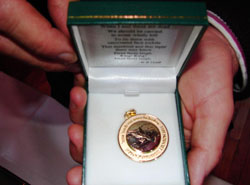 Jim Gibney writes about a unique reunion of former prisoners – those who took part in the protest for political status in Armagh Jail and the H-Blocks between 1976 and 1981:
Jim Gibney writes about a unique reunion of former prisoners – those who took part in the protest for political status in Armagh Jail and the H-Blocks between 1976 and 1981:
There have been many episodes in the conflict over the last fifty years when republicans were called upon to perform feats of considerable human endurance.
Many of these episodes are linked to one kind of imprisonment or another. Sometimes the individual was pitted against interrogators and had to withstand the brutality and cruelty of a protracted interrogation as in the case of those republicans who became known as the ‘hooded men’, who were arrested after the introduction of internment in August 1971 and were especially selected for torture. Other times it was the feeling of isolation, the loneliness of a prison cell, surrounded by hostility as experienced by republicans who spent long years in jail in prisons in England, the US and Europe. Or the experience of those republicans who were forced to live in exile, away from their family and friends, and had to cope with all manner of loss, including family bereavement or missing out on joyous family occasions.
Of all of the challenges faced by republicans the period which demanded more from them in terms of commitment, endurance, single-mindedness and dedication was the period between 1976 and 1981. This was the period when the British Prime Minister Margaret Thatcher set out to use all the resources at her command, and that the British state possessed, to try to crush the republican struggle by trying to criminalise republican prisoners. The struggle inside the prisons, the H-Blocks and Armagh Women’s Prison, were epic in terms of their longevity, the personal cost to each of the prisoners involved and their families and the significant political changes that arose out of the prison protest.
The protracted clash between the republican political prisoners and the British government produced a David versus Goliath contest. In the words of Bobby Sands – what was won in the prison protest and what was lost was won and lost for ‘the republic’. That outlook was the defining psychological context for the prisoners. They were defending Ireland’s ancient claim to nationhood, to independence, to freedom, from occupation by our nearest neighbouring island – Britain. Bobby Sands’ remarks symbolised where the prisoners in the H-Blocks and Armagh Women’s Prison stood. Margaret Thatcher symbolised the stance taken by the British government perhaps none more so than in her comments inside Stormont – then viewed as the seat of unionist one-party rule – when the hunger strike was at its peak. She said the IRA was playing its last card!
So it is hardly surprising that those who took part in that protest would be proud of themselves for doing so and for inflicting a defeat on Thatcher and the British government. On Saturday 8th October several hundred people gathered in Belfast to honour the memory of the ten hunger strikers who died during the protest and Michael Gaughan and Frank Stagg who died on hunger strike in English jails, and to acknowledge all those blanketmen and women protestors who spent years in cellular confinement and experienced appalling levels of deprivation and brutality by prison warders.
It was the rarest of rare nights. So rare in fact that it took over thirty years to organise the gathering. It was a special night. A night when men and women, now in their middle years, brought their children to witness a reunion of old comrades who formed enduring bonds of friendship and comradeship in the most extreme and personally challenging circumstances. They were joined by several of the hunger strikers’ relatives and women like Maura Mc Crory and Lily Fitsimmons whose sons were on the blanket protest and who led the popular protest movement on the outside in support of the prisoners. At the time they were joined by other mothers and stood in prominent public places clad only in a blanket on the streets of Belfast, Dublin, Paris and New York.
It was a night when all republicans on the protest were remembered. This was reflected in the imagery around the hall: on stage was a portrait of Brendan ‘Darkie’ Hughes, Mairead Farrell and Kieran Nugent, the first man to wear a blanket and refuse to wear a prison uniform.
A medal struck for the occasion was presented to the ex-prisoners by relatives of those who died on the 1981 hunger strike. It was received with pride and was shown to others as a badge of honour of recognition for participating in a gruelling yet worthy and noble self-sacrifice, the influence of which is still being played out politically to this day.



